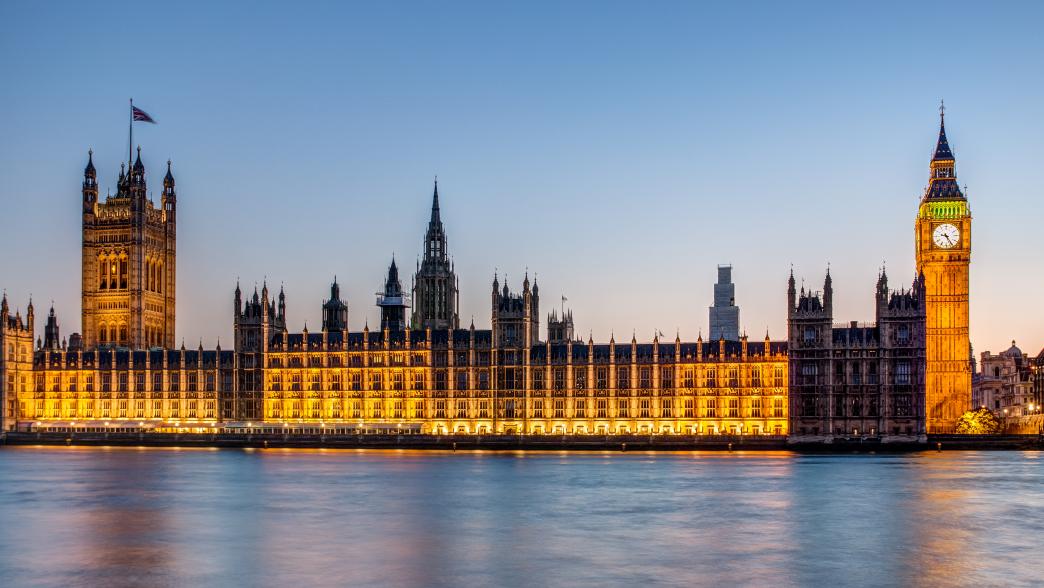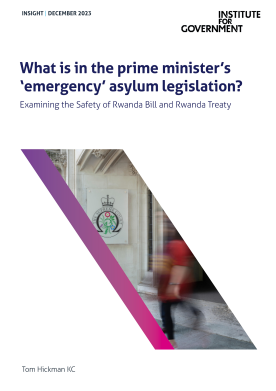Safety of Rwanda Bill: What happens next in parliament?
What are the upcoming legislative stages for the government's immigration legislation?

On Wednesday 17 December the Safety of Rwanda (Asylum and Immigration) Bill passed third reading by 320 votes to 276, a majority of 44. Eleven Conservative MPs voted against the bill. So what happens next? This explainer sets out the next legislative stages for the Safety of Rwanda Bill – which home secretary James Cleverley describes as "very much pushing at the edge of the envelope... [but] within the framework of international law." 4 https://www.theguardian.com/uk-news/2023/dec/12/rishi-sunak-survives-rwanda-bill-commons-vote?ref=lite.improvethenews.org
What is in the government's bill?
The government introduced its emergency legislation in early December. More details about the content of the legislation can be found in our explainer by Sir Jonathan Jones, alongside analysis of the legislation and treaty by Tom Hickman KC.
This is primary legislation. This is important for two reasons. First, because it means that the legislation must be passed through parliament like any other bill, and could therefore be amended or even blocked. And second, because primary legislation cannot be challenged in the UK courts.
How will the government's planned emergency legislation be passed by parliament?
The planned legislation will go through parliament in the same way as any other bill.
Although the government has stated that this will be ‘emergency’ legislation, this term has no official meaning: parliament does not have any different or special procedures to pass emergency legislation.
Instead, the term is used by government to refer to legislation it intends to fast-track, through both Houses quicker than a normal bill. There is no set time for how long this can take: sometimes emergency legislation completes its entire parliamentary journey within a few days, but it can take longer.
The government can use ‘programme motions’ – which set out the schedule for a bill’s passage – in the Commons but not in the Lords. So although the Lords will usually agree to pass a bill that the government has described as ‘emergency’ legislation quite quickly, it is under no obligation to do so.
The legislation passed the Commons on 17 January, and will now go to the Lords.
What scrutiny will take place in the Lords?
The key difference between Commons and Lords scrutiny is that legislative stages in the Lords are not timetabled. The scrutiny carries on for as long as there is appetite from peers to table and discuss amendments. Given the political and constitutional significance of the bill it is reasonable to anticipate that the Lords will take their time in digging into its provisions.
Lords scrutiny consists of the same stages as the Commons – 1st and 2nd reading, committee stage, report stage and 3rd reading. All peers can participate in the committee stage should they wish to do so.
What happens when the Lords has finished scrutinising the bill?
The Lords will return to the Commons the amendments it suggests to the text it received from the lower house. The Commons then considers those specific changes – it cannot return to any aspect of the bill where no amendments have been proposed. It can accept or reject amendments or reject and propose an alternative form of wording. The Commons decides on each amendment and then sends the bill back to the Lords. This process of ‘ping pong’ continues until a final text is agreed.
Could the Lords block or delay the government’s proposed legislation?
Yes. Either House could block or delay the government’s proposed legislation – in the same way they could block or delay any bill – and there is speculation that this particular legislation may run into difficulties in the Lords.
This is for two main reasons. First, the government does not have a majority in the Lords and the House is often less overtly political than the lower chamber, making government defeat more frequent. Data from parliament shows that the government has been defeated in the Lords over 360 times since the 2019 election. Second, the content and context of this bill is likely to be controversial in the upper House. The Lords has previously taken considerable interest in bills on related subjects –such as the Illegal Migration Act – and it could do so again.
Even if the Lords does not outright block the legislation, it could either get bogged down in the upper House (where government cannot control the timetable in the same way) or with amendments that the government then has to remove during ‘ping-pong’.
What is in the prime minister’s ‘emergency’ asylum legislation?: Examining the Safety of Rwanda Bill and Rwanda Treaty
The implications for constitutional and international law of the prime minister’s latest Rwanda gamble.
Download
Could the Parliament Act(s) be used?
Not in this parliament. The conditions that must be met to use the Parliament Act(s) cannot be fulfilled at this point in the electoral cycle.
While the Parliament Act(s) allow the government to force primary legislation through parliament in the event that the House of Lords blocks or delays a bill, certain conditions have to be met.
First, the bill in question needs to have been considered in two consecutive sessions of parliament, and the current session of parliament is expected to be the last before the next election. The government could choose to end this session at any point and hold another session before the next election, but this would have knock-on effects for the rest of its legislative agenda and could make it unable to pass its other bills.
The second timing requirement for using the Parliament Act(s) is that at least one year must have elapsed between second reading in the Commons in the first of the two sessions and the date it passes the Commons in the second session, and the bill must be sent to the Lords at least one month before the end of the second session. It is set out in law that the current parliament must dissolve no later than the beginning of 17th December 2024, ahead of the next general election. This timing means the government will not be able to use the Parliament Act(s) to force through this legislation (or, indeed, any other legislation first introduced in the remainder of this parliament).
- Keywords
- Immigration Parliamentary scrutiny
- Political party
- Conservative
- Position
- Home secretary Prime minister
- Administration
- Sunak government
- Department
- Home Office
- Public figures
- Rishi Sunak James Cleverly
- Publisher
- Institute for Government